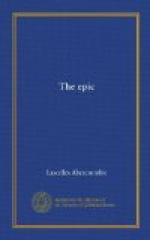But of course the early epics do not, any of them, merely repeat the significance of Homer in another form. They might do that, if poetry had to inculcate a moral, as some have supposed. But however nicely we may analyse it, we shall never find in poetry a significance which is really detachable, and expressible in another way. The significance is the poetry. What Beowulf or the Iliad or the Odyssey means is simply what it is in its whole nature; we can but roughly indicate it. And as poetry is never the same, so its significance is never quite the same. Courage as the first necessary value of life is most naively and simply expressed, perhaps, in the Poem of the Cid; but even here the expression is, as in all art, unique, and chiefly because it is contrived through solidly imagined characters. There is splendid characterization, too, in the Song of Roland, together with a fine sense of poetic form; not fine enough, however, to avoid a prodigious deal of conventional gag. The battling is lavish, but always exciting; and in, at least, that section which describes how the dying Oliver, blinded by weariness and wounds, mistakes Roland for a pagan and feebly smites him with his sword, there is real and piercing pathos. But for all his sense of character, the poet has very little discretion in his admiration of his heroes. Christianity, in these two poems, has less effect than one might think. The conspicuous value of life is still the original value, courage; but elaboration and refinement of this begin to appear, especially in the Song of Roland, as passionately conscious patriotism and loyalty. The chief contribution of the Nibelungenlied to the main process of epic poetry is plot in narrative; a contribution, that is, to the manner rather than to the content of epic symbolism. There is something that can be called plot in Homer; but with him, as in all other early epics, it is of no great account compared with the straightforward linking of incidents into a direct chain of narrative. The story of the Nibelungenlied, however, is not a chain but a web. Events and the influence of characters are woven closely and intricately together into one tragic pattern; and this requires not only characterization, but also the adding to the characters of persistent and dominant motives.




